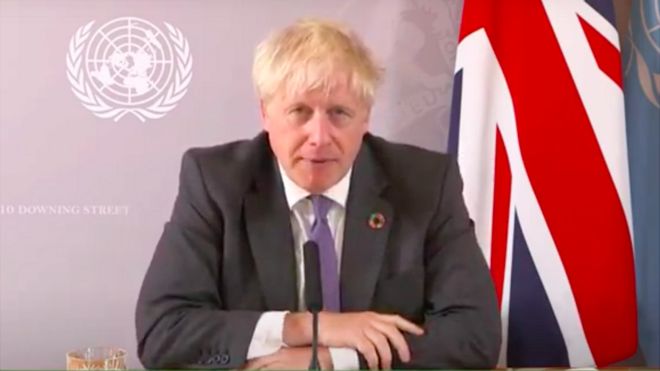Boris Johnson promises to power every UK home with offshore wind within a decade, pledging to make the coronavirus pandemic a catalyst for green growth.
In a speech at the Conservative Party virtual conference on Tuesday, he will say that the government will invest in a future of wind power turbines to create “hundreds of thousands, if not millions of jobs” over the next decade.
The prime minister said the UK would “become the world leader in low-cost clean power generation, cheaper than coal and gas,” comparing the UK’s resources in offshore wind with the oil wealth of Arabia. Saudi.
“We believe that within 10 years, offshore wind power will power every home in the country, with our goal increasing from 30 gigawatts to 40 gigawatts,” he will say. «Your kettle, your washing machine, your kitchen, your heating, your plug-in electric vehicle; all will get their juice cleanly and without guilt from the breezes that blow around these islands.
The government has come under fire in recent months for failing to put in place plans for an ecological recovery that would put the UK on track to meet its goal of net zero carbon emissions by 2050. Aside from £ 3bn for home insulation, There were no ecological measures in the Covid-19 recovery plan.
The promise was the first step in a 10-point “Rebuild Greener” plan, which the prime minister would establish later in the year and includes new targets and investments in industries, innovation and infrastructure.
The prime minister did not mention onshore wind, which is the cheapest form of wind power, but it has been subject to strict planning regulations introduced by David Cameron, which has meant that few onshore wind turbines have been built in the UK in the last five years.
Johnson will say that the government will invest £ 160 million in manufacturing the next generation of wind turbines, including floating turbines capable of delivering 1 GW of wind power by 2030, 15 times more than floating capacity in the rest of the world combined.
Downing Street said the initial investment would quickly create around 2,000 construction jobs and enable the sector to support up to 60,000 jobs directly and indirectly by 2030 in ports, factories and supply chains.
“Far in the deeper waters, we will reap the gusts, and by upgrading infrastructure in places like Teesside and Humber and Scotland and Wales we will increase offshore wind capacity that is already the largest in the world,” Johnson said.
“As Saudi Arabia is for oil, the UK is for wind, a place of almost limitless resources, but in the case of wind without the carbon emissions and without the damage to the environment.”
In tacit recognition of how wind power has been controversial among conservative grassroots, Johnson said it had been used at key moments in British history.
“I remember how some people used to scoff at wind power 20 years ago and say it would not remove the skin from rice pudding,” he says. “It was offshore wind that blew the sails of Drake, Raleigh, and Nelson, and propelled this country to commercial greatness.”
Johnson said the target would help the UK meet its target of net zero by 2050, a target that has been criticized by activists as unambitious.
Downing Street said new offshore floating technology would allow wind farms to be built further out to sea in deeper waters, increasing capacity even further where the winds are strongest and ensuring the UK remains at the forefront of the next generation. of wind power.


